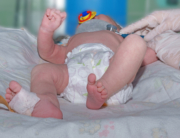Every case is different, so we cannot give a standard number for the compensation your child can receive for a birth injury. However, we can explain that the amount of compensation will depend on several factors, including the type of birth injury, the severity of the birth injury, anticipated short-term and long-term impacts of the injury on your child’s life and negligence that caused the birth injury.
Sometimes tragic accidents happen, and no one is liable under the law. But if your child will not get to have the life he would have enjoyed because someone was careless, impatient, incompetent, or inattentive during his birth, we will fight to get you all the compensation your family deserves.
Birth Injury vs. Birth Defect
Many people confuse birth injuries with birth defects, but they are entirely different medical conditions. Most birth defects, which are also known as congenital disabilities, come from your child’s DNA, for example, a chromosomal anomaly that results in a heart murmur, Down syndrome, or cleft palate. Most birth defects are not preventable, but some are the result of outside factors, like medications or other drugs harming the baby during pregnancy.
A birth injury happens when the baby suffers harm during the labor and delivery. Birth injuries can be the result of human error.
Common Birth Injuries
These are some of the birth injuries that occur most often, and how they can happen:
- Cerebral palsy from lack of oxygen to the brain during labor or delivery
- Brain damage from skull fractures due to forceps pressure or lack of oxygen
- Wrongful death from complications during labor or delivery
- Brachial plexus injury due to stretching or tearing nerves in the neck or shoulders
- Disfigurements like facial scarring from forceps or a vacuum extraction tool
Compensable Damages from the Short-term Effects of the Birth Injury
Some birth injuries leave only short-term consequences, which can heal with specialized treatments and an extended stay in the hospital. Even if your child recuperates fully after a few weeks or months and lives a healthy life, you might still have these damages:
- Higher medical bills
- Lost wages for parents to be with the child at the hospital and at home
- Pain and suffering for what your child endured
- Mental anguish
Compensable Damages from the Long-term Effects of Birth Injuries
If labor or delivery goes wrong, your child might only live a few days, be vulnerable to a shortened lifespan or need a life care plan.
In these situations, your compensable damages can include all the short-term losses mentioned above, plus wrongful death claims or lifetime care costs, both assistive and medical care.
What We Have to Prove in a Birth Injury Case
Getting compensation for your child’s birth injury is not automatic. We must investigate to find out what and who caused the damage to your child. We will have to prove that:
There Was Duty of Care
For example, your obstetrician (OB) has a duty to provide the same level of care to you that a typical obstetrician with her level of training and experience would in a similar situation.
The Duty of Care Was Breached
Let’s say that the OB pulled the baby by the arms in an improper manner during delivery. This action would likely be a breach of her duty of care, which would amount to negligence.
Negligence Caused Birth Injury
Incorrectly pulling the baby’s arms damaged the nerves in the neck and shoulders, causing a brachial plexus injury with paralysis in one of the baby’s arms.
Child Suffered Measurable Harm
In this example, your child has permanent paralysis in one of his or her arms as a result of the negligence.
How to Get Compensation for Birth Injuries
If your child sustained birth injuries, the attorneys at the Montero Law Center want to help you obtain compensation. Please call us at 954-767-6500, so we can schedule a free case review. During this review, you can ask questions, and our legal team can explain the legal options available. We do not charge any legal fees until you recover compensation.
 English
English  Español
Español 

